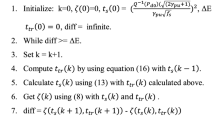Abstract
Considering the dynamic changes and uncertainty features of the radio environment in cognitive wireless networks (CWNs), the environment cognition ability is critical for the performance evaluation of CWNs design and optimization. However, there are no effective metrics to evaluate the ability and gain of information cognition in CWNs from an information theory perspective. Therefore, the novel cognitive information concept is proposed and defined as a metric to evaluate the uncertainty of both the internal and external environments of one system that can be removed by other systems or nodes using cognitive radio techniques. As an intelligent wireless communication system that is aware of its surrounding radio, network, and user multi-domains environment, the more cognitive information it achieves, the higher level cognitive capability it is. In this paper, we define and analyze the mathematical features of cognitive information. Results reveal that the increase of cognitive information can improve the spectrum efficiency and reduce the interference probability simultaneously in CWNs. Thus cognitive information can be regarded as a metric for CWNs optimization. Finally, we apply the theory of cognitive information in the parameters optimization in energy detection and cooperative spectrum sensing.






Similar content being viewed by others
References
Mitola J (1999) Cognitive radio: making software radios more personal. IEEE Pers Commun 6:13–18
Wang BB, Liu KJR (2011) Advances in cognitive radio networks: a survey. IEEE J Sel Top Sign Process 5:5–23
Demestichas P, Dimitrakopoulos G, Strassner J et al (2006) Introducing reconfigurability and cognitive networks concepts in the wireless world. IEEE Veh Technol Mag 1:32–39
Zhang P, Liu Y, Feng ZY et al (2012) Intelligent and efficient development of wireless networks: a review of cognitive radio networks. Chin Sci Bull 57:3662–3676
Haykin S (2005) Cognitive radio: brain-empowered wireless communications. IEEE J Sel Areas Commun 23:201–220
Zhao Y, Mao S, Neel JO et al (2009) Performance evaluation of cognitive radios: metrics, utility functions, and methodology. Proc IEEE 97:642–659
Ahmed W, Gao J, Faulkner M (2009) Performance evaluation of a cognitive radio network with exponential and truncated usage models. In: Proceedings of 4th international symposium on wireless pervasive computing, Melbourne. IEEE, Washington DC, pp 1–5
Cavdar D, Yilmaz H B, Tugcu T et al (2010) Analytical modeling and performance evaluation of cognitive radio networks. In: Proceedings of sixth advanced international conference on telecommunications, Barcelona. IEEE, Washington DC, pp 35–40
Yucek T, Arslan H (2009) A survey of spectrum sensing algorithms for cognitive radio applications. IEEE Commun Surv Tutor 11:116–130
Liang YC, Zeng YH, Peh ECY et al (2008) Sensing-throughput tradeoff for cognitive radio networks. IEEE Trans Wireless Commun 7:1326–1337
Shen J, Liu S, Zeng L et al (2009) Optimisation of cooperative spectrum sensing in cognitive radio network. IET Commun 3:1170–1178
Cover TM, Thomas JA (1991) Elements of Information Theory. Wiley, New York
Acknowledgments
This work was supported by the National Natural Science Foundation of China (61227801, 61201152, 61121001), the Major State Basic Research Development Program of China (973 Program, 2009CB320400), the National Science and Technology Major Project (2012ZX03003006), the Program for New Century Excellent Talents in University (NCET-01-0259), the Fundamental Research Funds for the Central Universities (2013RC0106).
Author information
Authors and Affiliations
Corresponding authors
About this article
Cite this article
Feng, Z., Wei, Z., Zhang, Q. et al. Cognitive information metrics for cognitive wireless networks. Chin. Sci. Bull. 59, 2057–2064 (2014). https://doi.org/10.1007/s11434-014-0240-7
Received:
Accepted:
Published:
Issue Date:
DOI: https://doi.org/10.1007/s11434-014-0240-7




